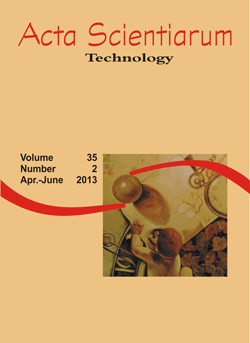<b>Design of a digital modulator and demodulator for reader-less RFID Tag in 0.18 µm CMOS process</b> - doi: 10.4025/actascitechnol.v35i2.15202
DOI:
https://doi.org/10.4025/actascitechnol.v35i2.15202Palavras-chave:
barker code, demodulator, IEEE 802.11, modulator, RFIDResumo
Both the Radio Frequency Identification (RFID) and Wireless Fidelity (WiFi) are popular and ubiquitous technologies. However, RFID is lagging behind due to vendor specific solutions and excessive reader cost. A WiFi compatible IEEE 802.11 RFID tag can eliminate the reader. A digital modulator and demodulator for the reader-less RFID tag in IEEE 802.11 protocol employing Direct Sequence Spread Spectrum (DSSS) and Barker code are proposed in this paper. To generate the 11-bit Barker code, MOD-11 synchronous counter and encoder are designed by utilizing only four D flip-flops instead of preloading the code sequence in multiple registers. For modulation, data are multiplied with this Barker code and for demodulation, the received data are multiplied with the same Barker code. Designed in 0.18 µm CMOS technology, the minimum, average and maximum power consumptions are 3.64 nA, 17.64 µA and 7.61 mA, respectively. The simulation results show the correct functionality of the modulator and demodulator where 1 bit is spread to 11 bits and 11 bits received data are de-spread to 1 bit, respectively. The design would help to implement the modulator and demodulator for the reader-less RFID tag with resistance to multi-path fading and interference and covering the highest distance with lower Bit Error Rate (BER).Â
Downloads
Downloads
Publicado
Como Citar
Edição
Seção
Licença
DECLARAÇíO DE ORIGINALIDADE E DIREITOS AUTORAIS
Declaro que o presente artigo é original, não tendo sido submetido í publicação em qualquer outro periódico nacional ou internacional, quer seja em parte ou em sua totalidade.
Os direitos autorais pertencem exclusivamente aos autores. Os direitos de licenciamento utilizados pelo periódico é a licença Creative Commons Attribution 4.0 (CC BY 4.0): são permitidos o compartilhamento (cópia e distribuição do material em qualqer meio ou formato) e adaptação (remix, transformação e criação de material a partir do conteúdo assim licenciado para quaisquer fins, inclusive comerciais.
Recomenda-se a leitura desse link para maiores informações sobre o tema: fornecimento de créditos e referências de forma correta, entre outros detalhes cruciais para uso adequado do material licenciado.



















